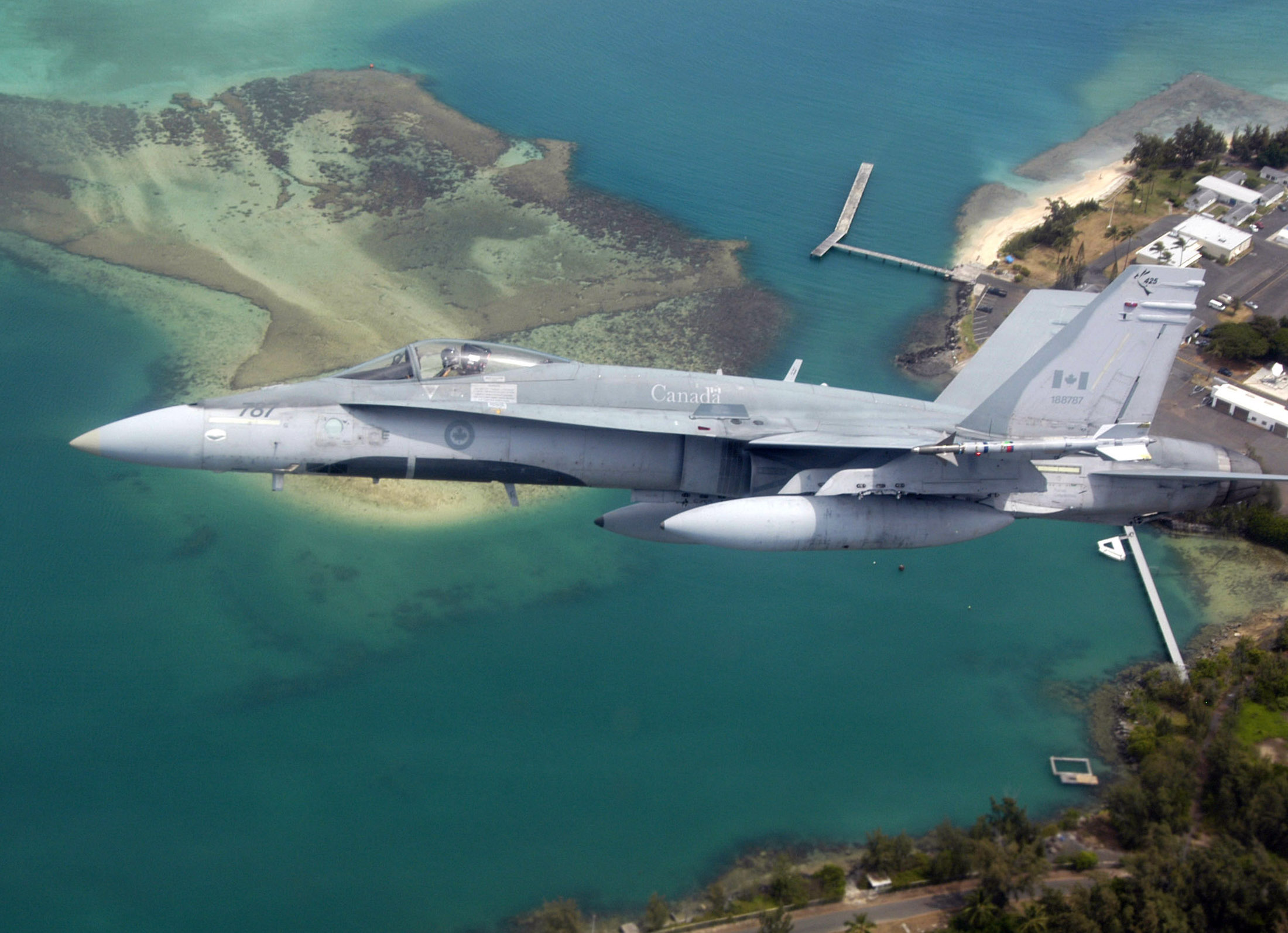
THE PENTAGON — The proposed $5.23 billion sale of 18 F/A-18E/F Super Hornet strike fighters to Canada received U.S. Department of State approval, marking a significant step toward U.S. ally’s plan to upgrade its aging fighter jet fleet.
If the sale is completed, Canada will purchase ten F/A-18E Super Hornet aircraft with F414-GE-400 engines, and eight F/A-18F Super Hornet aircraft with F414-GE-400 engines. Canada will also be purchasing various weapons systems, spare parts, flight gear, and material support as part of the deal, according to a statement released by the Defense Security Co-operation Agency.
“This proposed sale will contribute to the foreign policy and national security objectives of the United States by helping to improve the security of a NATO ally which has been, and continues to be, a key democratic partner of the United States in ensuring peace and stability,” is how the agency justified the potential sale, through a statement.
State approval is an important milestone for the potential sale, but the final purchase still must be approved by Congress. The Defense Security Cooperation Agency formally notified Congress of the possible sale on Monday.
The announced deal is also significant because Canada has for years appeared to waffle on how it would upgrade the jets in its air force. Canadian news reports have routinely reported how successive governments have wrestled with the question of how much to spend on new fighter jets.
The potiential cost of the F-35s has been an itense political topic in Canada, the Toronto-based Globe and Mail reported in May the Boeing-made Super Hornet appeared to become the favored option.
The Canadian government was said to also be considering the F-35, along with a pair of European-built fighters, but balked at the higher price tag, according to the Globe and Mail.

For years, though, the current Liberal Party-controlled Canadian government hinted the F-35 would not be its fighter jet of the future. Not buying the F-35 was part of current Prime Minister Justin Trudeau’s 2015 campaign, including a specific “No F-35” plank in his party’s platform.
The following is the complete Sept. 12, 2917 DSCA Statement.
WASHINGTON, Sep. 12, 2017 – The State Department has made a determination approving a possible Foreign Military Sale to the Government of Canada of ten (10) F/A-18E Super Hornet aircraft, with F414-GE-400 engines; eight (8) F/A-18F Super Hornet aircraft, with F414-GE-400 engines; eight (8) F414-GE-400 engine spares; twenty (20) AN/APG-79 Active Electronically Scanned Array (AESA) radars; twenty (20) M61A2 20MM gun systems; twenty-eight (28) AN/ALR-67(V)3 Electronic Warfare Countermeasures Receiving Sets; fifteen (15) AN/AAQ-33 Sniper Advanced Targeting Pods; twenty (20) Multifunctional Information Distribution Systems–Joint Tactical Radio System (MIDS-JTRS); thirty (30) Joint Helmet Mounted Cueing Systems (JHMCS); twenty-eight (28) AN/ALQ-214 Integrated Countermeasures Systems; one hundred thirty (130) LAU-127E/A and or F/A Guided Missile Launchers; twenty-two (22) AN/AYK-29 Distributed Targeting System (DTS); twenty-two (22) AN/AYK-29 Distributed Targeting Processor (DTP); one hundred (100) AIM-9X-2 Sidewinder Block II Tactical Missiles; thirty (30) AIM-9X-2 Sidewinder Block II Captive Air Training Missiles (CATM); eight (8) AIM-9X-2 Sidewinder Block II Special Air Training Missiles (NATM); twenty (20) AIM-9X-2 Sidewinder Block II Tactical Guidance Units; sixteen (16) AIM-9X-2 Sidewinder Block II CATM Guidance Units.
Also included in this sale are AN/AVS-9 Night Vision Goggles (NVG); AN/ALE-47 Electronic Warfare Countermeasures Systems; AN/ARC-210 Communication System; AN/APX-111 Combined Interrogator Transponder; AN/ALE-55 Towed Decoys; Joint Mission Planning System (JMPS); AN/PYQ-10C Simple Key Loader (SKL); Data Transfer Unit (DTU); Accurate Navigation (ANAV) Global Positioning System (GPS) Navigation; KIV-78 Duel Channel Encryptor, Identification Friend or Foe (IFF); CADS/PADS; Instrument Landing System (ILS); Aircraft Armament Equipment (AAE); High Speed Video Network (HSVN) Digital Video Recorder (HDVR); Launchers (LAU-115D/A, LAU-116B/A, LAU-118A); flight test services; site survey; aircraft ferry; auxiliary fuel tanks; aircraft spares; containers; storage and preservation; transportation; aircrew and maintenance training; training aids and equipment, devices and spares and repair parts; weapon system support and test equipment; technical data Engineering Change Proposals; technical publications and documentation; software; avionics software support; software development/integration; system integration and testing; U.S. Government and contractor engineering technical and logistics support; Repair of Repairable (RoR); repair and return warranties; other technical assistance and support equipment; and other related elements of logistics and program support. The estimated total case value is $5.23 billion. The Defense Security Cooperation Agency delivered the required certification notifying Congress of this possible sale on September 11, 2017.
This proposed sale will contribute to the foreign policy and national security objectives of the United States by helping to improve the security of a NATO ally which has been, and continues to be, a key democratic partner of the United States in ensuring peace and stability. The acquisition of the F/A-18E/F Super Hornet aircraft, associated weapons and capability will allow for greater interoperability with U.S. forces, providing benefits for training and possible future coalition operations in support of shared regional security objectives.
The proposed sale of the F/A-18E/F Super Hornet aircraft will improve Canada’s capability to meet current and future warfare threats and provide greater security for its critical infrastructure. Canada will have no difficulty absorbing this equipment into its armed forces.
The proposed sale of this equipment and support does not alter the basic military balance in the region.
The principal contractors will be: Boeing Company, St. Louis, MO; Northrop Grumman, Los Angeles, CA; Raytheon, El Segundo, CA; General Electric, Lynn, MA; and Raytheon Missile Systems Company, Tucson, AZ. The Government of Canada has advised that it will negotiate offset agreements with key U.S. contractors.
Implementation of this proposed sale will require the assignment of contractor representatives to Canada on and intermittent basis over the life of the case to support delivery of the F/A-18E/F Super Hornet aircraft and weapons and to provide supply support management, inventory control and equipment familiarization.
There will be no adverse impact on U.S. defense readiness as a result of this proposed sale.
This notice of a potential sale is required by law and does not mean the sale has been concluded.





